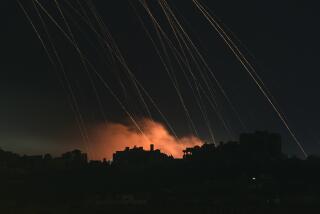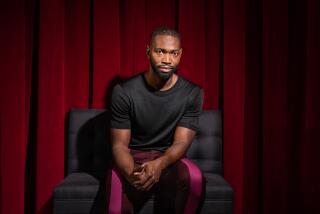Reza Abdoh; Director Courted Outrage
- Share via
Reza Abdoh, the confrontational theater and operatic director whose casts mooned audiences, became slaves under torture and hung nude and upside down in fish tanks, died Thursday.
His producer, Diane White, said he died in his New York City home at age 32 of the complications of AIDS.
The half-Persian, half-Italian writer and philosopher, whose in-your-face theatrical spectacles prompted equal amounts of rage and applause, made his life an animated protest of what he saw as a society in decay.
Although not always a popular success, his work was generally staged to critical accolades. Most recently he was saluted by the CalArts/Alpert Foundation, which this month had granted him one of five $50,000 fellowships. The Vienna Festival had recently commissioned his latest play, “A Story of Infamy,” which was to have opened in Vienna on May 22.
Abdoh, who reveled in the wake of his dramatized outrages, replied to his critics by saying, “I’m not in the business of pandering to the audience.”
There never was a doubt.
Physically, he was of slight build, brooding and intense, a theatrical Wunderkind who had matured into one of the most adventurous presences in the modern theater.
Since coming to Los Angeles 15 years ago, he had staged several original pieces of performance art, most at the ill-fated Los Angeles Theatre Center on Spring Street in Downtown Los Angeles.
He left the city for New York four years ago after LATC closed for lack of support.
The titles reflect the diversity of his outrage: “Peep Show,” “Pasos en la Obscuridad” (Footsteps in the Darkness), “The Hip-Hop Waltz of Eurydice,” “Bogeyman,” “Tight, Right, White,” “The Law of Remains,” in which he foresaw the prison slaying of Jeffrey Dahmer, and his highly praised “Quotations From a Ruined City.”
If there was a commonality to his oeuvre it was that in the United States the plays were staged in downtrodden storefronts, warehouses and lofts or discarded hotels. In Europe, however, Abdoh’s efforts were seen at major arts festivals and received with enthusiasm, White said.
His Dar a Luz group was likened to a talented, tribe-like ensemble of young men and women who thrived on variety and a constant diet of surprise.
At age 21 Abdoh had staged a “King Lear” at the Access Theater in Los Angeles, where he surrounded the words of Shakespeare with cumbersome ramps, platforms, scaffolding and tormenting nightmares.
Seven years later he made Giuseppe Verdi’s opera “Simon Boccanegra” with a stark approach but a traditional basso (Jerome Hines) in the title role.
Between those landmark yardsticks were his own often confusing but never muffled looks at life.
A 1990 Los Angeles Times Magazine profile on Abdoh called him “a genuine visionary, a reincarnation of the 1960s confrontational, experiments of communal ensembles such as the Living and Open theaters . . . He’s not out to make a deal. . . . He’s determined to make art in an era when even the word artist is under siege.”
He was a writer who put ideas on paper but never produced scripts, who directed actors from the depths of a volatile imagination and who brought to the stage the mysticism of the Mideast and a classic British education.
His plays consist of fragments from art, film, music and opera, a method called “Cut Up” by novelist William Burroughs.
Born in Tehran, Abdoh described his family as “patriarchal domineering authoritarianism” and said his parents’ marriage (his father was a successful sports entrepreneur who married a woman 18 years his junior) was based on fear rather than respect.
The family moved to England when he was a boy and one of his first theatrical experiences was Peter Brook’s legendary circus version of “A Midsummer Night’s Dream.”
The pageantry and wild spectacle became characteristics of Abdoh’s own work.
He joined the National Youth Theatre in London and at 14 was directing main productions.
At 15 he was on his own and working with street artists. He traveled to India to study dance and soon was being invited to share his dance theater works at festivals in Scotland and France.
By then the Ayatollah Ruhollah Khomeini was controlling Iran, and Abdoh’s father (who had since returned to Iran from England) was judged a political enemy. The father fled to Los Angeles and suffered a heart attack, and Abdoh came here to attempt a reconciliation. It failed and Ali Muhammed Abdoh died in 1980.
Reza Abdoh’s mother, Homa, is newly arrived in New York from Iran.
Abdoh attended USC and met his future producer White and Bill Bushnell at the Los Angeles Theatre Center. He staged his first play there in 1985.
Besides his mother, three brothers and two sisters, Abdoh is survived by his longtime companion, actor Brenden Doyle.
Bushnell, who was artistic director of LATC, remembered Abdoh for his “awesome imagination and truly vibrant and unique talent. He was a genuine theater auteur and his perspective on contemporary American society was witheringly accurate.”
More to Read
The biggest entertainment stories
Get our big stories about Hollywood, film, television, music, arts, culture and more right in your inbox as soon as they publish.
You may occasionally receive promotional content from the Los Angeles Times.










